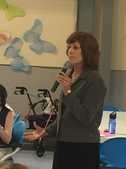|
We typically address the impact of mental and physical aspects of our health, but what about the spiritual? Our spiritual well-being is often left out and gets muddled with our emotional well-being, but they are not the same. Emotion is described as a reaction to a person, object, or situation in our life; it can be real or a thought. Our emotional responses are often connected to past experiences and are distinguished from reason or knowledge. Spirituality addresses the “big picture” – a search for meaning in our lives. Spirituality has many definitions, and a secular vs. religious distinction helps to clarify the meaning (Soul Matters: The Spiritual Dimension Within Healthcare by Dr. Mabel Aghadiuno). Secular spirituality is not necessarily connected to a specific belief system or even religious worship. Instead, it arises from our connection with ourselves and with others, the development of our personal value system, and our search for meaning in life. For many, spirituality takes on the more traditional form of religious observance, which includes a certain dogma, belief system and recognition of a higher power.
When it comes to sorting out the elements of “mind, body, spirit,” the whole point is that they are interconnected. Using this approach to healthcare is called holistic health. The mind-body connection is a well-known concept in medicine, but the spirit part is often cast aside. As health professionals, we assess physical and mental problems, but spiritual assessments are often dismissed as too time-consuming, not useful, irrelevant, or simply a check-box on the assessment form listing your religious practices (http://www.aafp.org/afp/2012/0915/p546.html). Practitioners are typically not adequately trained in the area of spiritual assessment, or they do not believe it has a place in the biomedical world of clinical practice. Yet studies demonstrate that most patients want their spiritual needs assessed and addressed and that patients feel their spirituality does result in improvement in their well-being (https://link.springer.com/article/10.1007/BF02248742). There are various spiritual assessment tools, but the groundwork begins with a patient simply wanting a trusting relationship with his/her doctor. Patients want their doctors to talk to them and to show some understanding. One could conclude that a doctor has the “power” to relieve suffering just by the “way they are.” According to the National Institute of Health, one of the lines in the modern version of the Hippocratic Oath is: I will remember that there is art to medicine as well as science. Physicians can learn the science part (treating the disease) in medical school and residency, but the artistic part (treating the patient) may take a lifetime of practice. So, what types of questions are asked in a spiritual assessment and what is the purpose? The following are some sample questions from the FICA Spiritual History Tool (http://www.aafp.org/afp/2012/0915/p546.html):
Moving on to complete the plan of care, the emotional and spiritual assessments may be considered the “art” of medicine because now you begin to treat the individual patient, not just the disease or condition. This is where the plan of care becomes customized and the paths of healing may have different outcomes. We would expect patients, who are more emotionally stable and have more positive attitudes, to have smoother paths to recovery than patients who are anxious, depressed and/or pessimistic. The approach to care requires modification, not judgment. In the spiritual realm, patients who have a sense of purpose in life, a connection to others, and/or believe in a higher power will often be more confident about their recovery. These patients may be more receptive to hope, feeling calmer and more peaceful. The spiritual assessment is relatively simple and not time-consuming and yet has the potential to greatly impact the outcome of the patient’s health status in a positive manner. Although we like to refer the spiritual assessments to the chaplaincy team, it is the doctors, nurses and health team members who can help the patient by utilizing this valuable assessment, showing some honesty, humility, and compassion. In conclusion, when people are struck with illness, the patient outcomes are potentially limited when healthcare providers are preoccupied with only the diagnosis and physical treatment. Illness is a human experience that impacts the lives of our patients on many levels: physically, mentally and spiritually. Our health is not just physical; it encompasses the mind, body and the soul. Hoping you all have a happy, healthy holiday season and New Year! Charlotte Michos is a clinical nurse specialist who values personal-centered care and serves as a Healthcare Consultant in helping others make informed decisions. For more information, email her or call (845) 548-5980.
0 Comments
Your comment will be posted after it is approved.
Leave a Reply. |
Please check back often.
© 2022 Charlotte Michos. LLC All rights reserved. Please contact Charlotte for permission to republish. Archives
March 2022
Categories |


 RSS Feed
RSS Feed